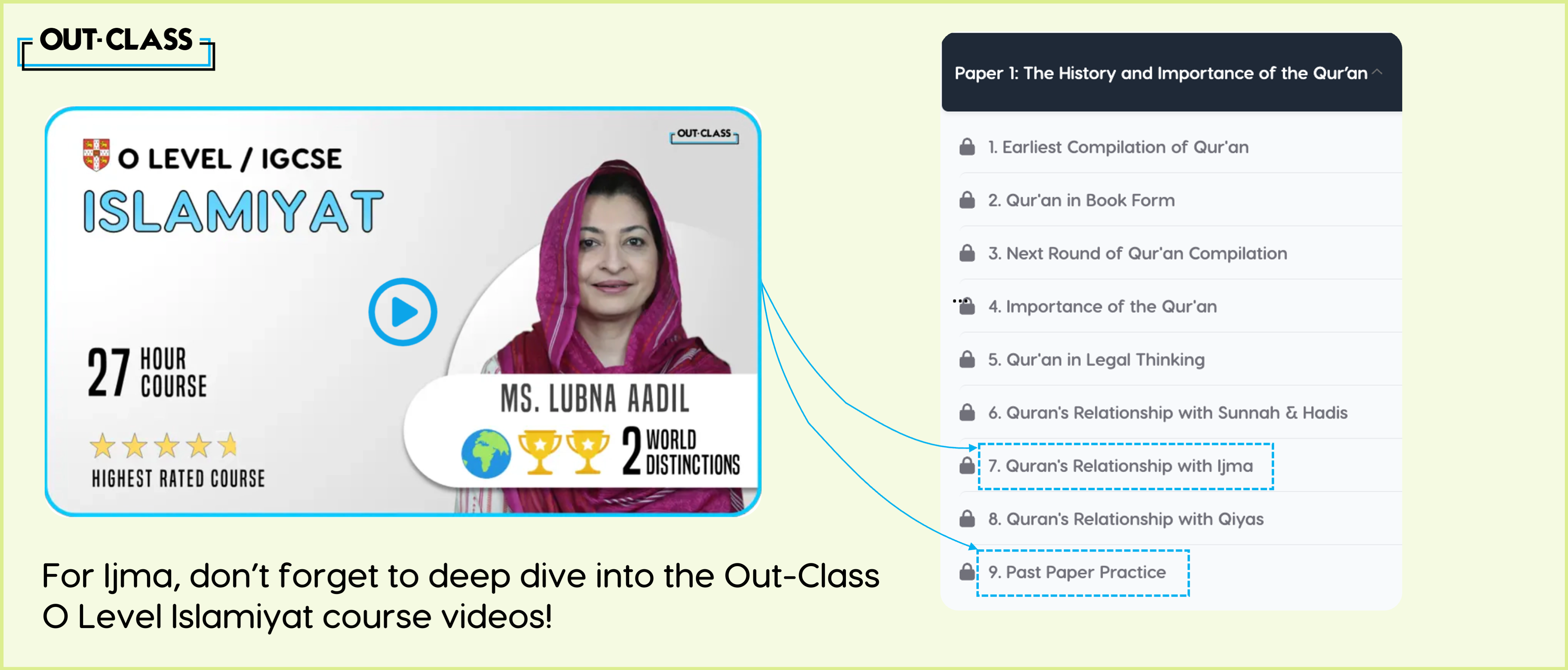Islam is a religion that has been kept sacred for centuries and is deemed by many Muslims to be a complete and comprehensive guide that can help them become the best example of Allah’s creation. Even so, due to changing times and trends, it can be difficult for us to abide by its rules, especially when they are seen through the lens of our modern society.
In such situations, Islam has provided us with an alternative source - Ijma. In this article, you will explore the concept of Ijma, its criteria for performing and its importance as provided in the IGCSE and O Level Islamiyat syllabus.
What is Ijma?
Ijma, in Islamic terms, refers to the consensus or agreement reached by qualified scholars of the Muslim community on a particular legal issue. When scholars agree on a specific interpretation or ruling based on the Quran or the Hadith, it is considered a source of Islamic Law. According to Abu Daud, the Holy Prophet (PBUH) had this to say about Ijma:
“Gather together the righteous from among my community and decide the matter with their council and do not decide it by any man’s opinion.”
Ijma is considered a secondary source of Islamic law (Shariah) after the Quran and the Hadith (sayings and actions of the Holy Prophet P.B.U.H) alongside Qiyas (Analogical Reasoning).
Difference between Ijma and Qiyas
While Ijma is meant to denote the consensus opinion of Muslim jurists at a particular time and generation, Qiyas involves analogical reasoning on an individual basis to make analogies and infer rulings for new issues or circumstances. It is considered a method of extending Islamic law to cover evolving situations.
What About Ijtihad?
Ijtihad is a broader concept of independent legal reasoning within which qiyas exist. Qiyas is a specific form of Ijtihad involving analogical reasoning. Therefore, similar to Qiyas, Ijtihad allows scholars to think critically and adapt Islamic law to new circumstances, ensuring its relevance to changing contexts.
Who is Worthy of Making Ijma?
The process of making Ijma involves the consensus of qualified Islamic scholars. They are known as mujtahids – scholars who don the mantle of independent reasoning. These intellectual powerhouses boast a profound understanding of the Quran and the Hadith and are also well-versed in the nuances of Islamic jurisprudence.
Scholars performing Ijma must have the following qualifications:
-
Extensive knowledge of the Quran and the Hadith
-
Proficiency in the Arabic language
-
Comprehensive understanding of the principles of Islamic jurisprudence (Usul al-Fiqh)
-
Ability to derive legal rulings from religious sources
The Importance of Ijma
Ijma is significant in providing a consensus-based understanding of Islamic law situations where the Quran and Hadith do not explicitly address a particular issue. It helps maintain unity within the Muslim community by establishing a collective decision-making process.
Examples of Ijma
Identifying specific instances of consensus can sometimes be challenging due to variations among different schools of thought and historical contexts. However, below are a few examples of Ijma performed in certain matters:
-
Compiling the Quran: There is consensus among Muslims that the Quran is the complete and unchanged word of God. The compilation and arrangement of the Quranic verses into a single book form were done during the caliphate of Abu Bakr and later standardized by the third caliph, Uthman. The Muslim community universally accepts this compilation as Ijma.
-
Prohibition of Riba (Usury/Interest): There is a general consensus among Islamic scholars that the charging or paying of interest (riba) is prohibited in Islam. This consensus is based on explicit Quranic verses and hadiths that condemn usury. The prohibition of riba is a widely accepted Ijma within the Islamic legal tradition.
-
Principles of Islamic Finance: Scholars have reached consensus on certain principles governing Islamic finance, such as the prohibition of interest, avoidance of uncertainty (gharar) and gambling (maisir) and adherence to ethical and moral considerations in financial transactions. While there may be differences in details, the broad principles reflect a form of Ijma within the field of Islamic finance.
-
Validity of the Friday Prayer (Jumu’ah): There is consensus among Islamic scholars that the Friday congregational prayer (Jumu’ah) is obligatory for adult, sane and healthy Muslim males who are not travelling. The details of the Friday prayer, including its timing and prayer format are generally agreed upon within the Muslim community.
Conclusion
While scholars may differ on the application of Ijma in specific cases, its undeniable significance in fostering unity and dispelling uncertainty cannot be overlooked.
For a comprehensive exploration of IGCSE/O Level Islamiyat topics, embark on your learning journey with our O Level & IGCSE Islamiyat crash course. Let the pursuit of knowledge light your path!
Most Common Repeated Questions:
Unlock the secrets to acing your CAIE IGCSE and O Level exams with a sneak peek into the most frequently asked questions that have graced the pages of Islamiyat past papers!
- How is the use of ijma ’ (consensus) important to Muslims today? [Oct/Nov 2012]
- (a) Write about how the Qur’an is used with the other three sources in Islamic law.
(b) How important is the use of ijma’ or qiyas in Islamic law in present day situations? Give reasons for your answers. [May/June 2016] [Oct/Nov 2014, 2018, 2019] - Why do you think the Qur’an and Sunna are not the only sources of Law and are supplemented by ijma’ and qiyas? Give examples to support your answers. [Oct/Nov 2017]




